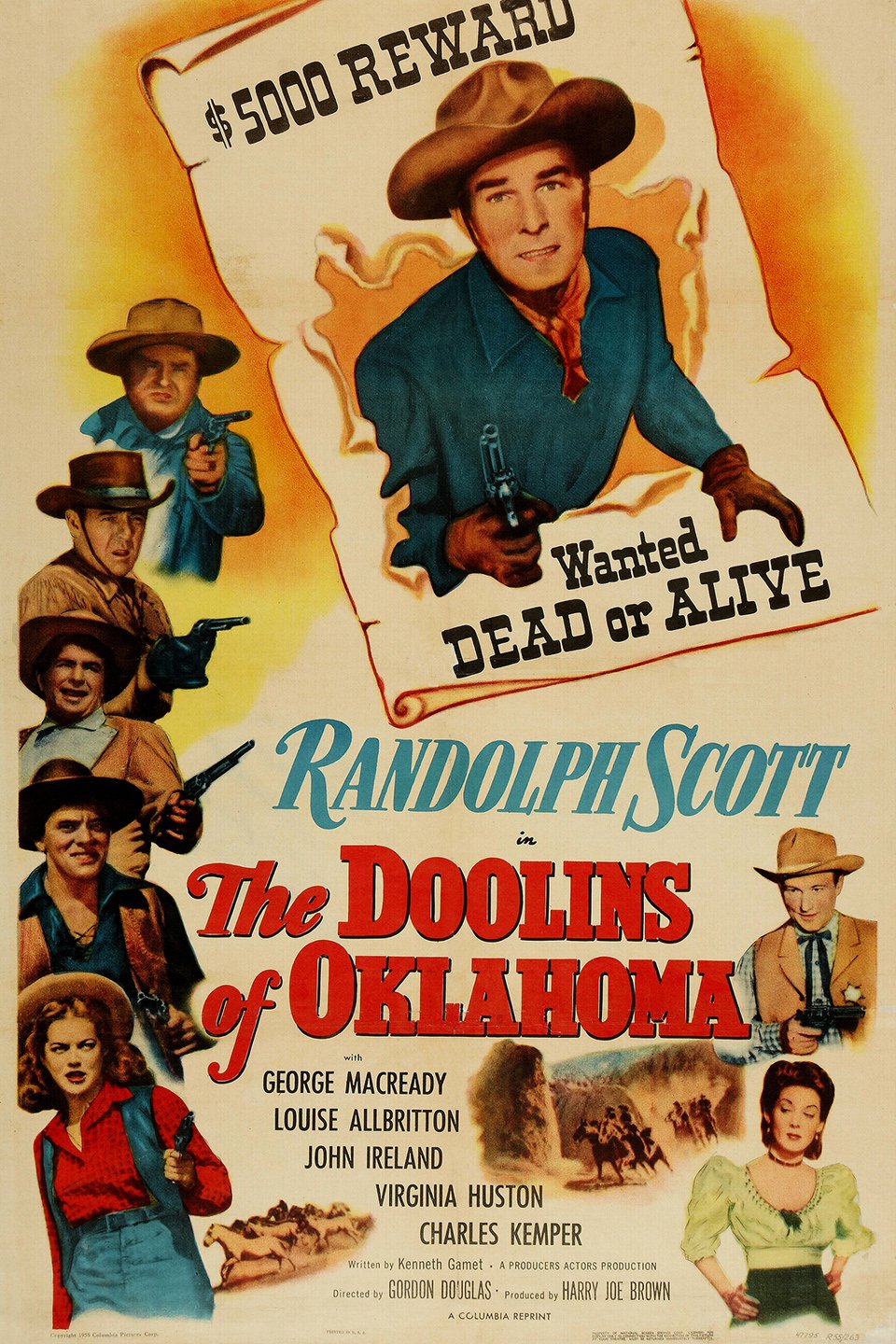
DOOLINS OF OKLAHOMA, THE
(director: Gordon Douglas; screenwriter: Kenneth Gamet; cinematographer: Charles Lawton, Jr.; editor: Charles Nelson; music: George Duning/Paul Sawtel/Marlin Skiles; cast: Randolph Scott (Bill Doolin), George Macready (Marshall Sam Hughes), Louise Allbritton (Rose of Cimarron), John Ireland (Bitter Creek), Noah Beery, Jr. (Little Bill), Charles Kemper (Arkansas Tom Jones), Frank Fenton (Red Buck), Jock Mahoney (Tulsa Jack Blake), Virginia Huston (Elaine Burton), Griff Barnett (Deacon Burton), Lee Patrick (Melissa Price), Robert H. Barrat (Marshal Heck Thomas), Robert Osterloh (Wichita Smith); Runtime: 90; MPAA Rating: NR; producer: Harry Joe Brown; Columbia Pictures; 1949)
“A pleasing B movie that capitalizes on a familiar Western formulaic set-up.”
Reviewed by Dennis Schwartz
Actor turned director Gordon M. Douglas (“The Nevadan”/”Saps at Sea”/”Rio Conchos”) turns in a pleasing B movie that capitalizes on a familiar Western formulaic set-up of a good man caught by circumstances and trapped in a life of crime. It’s written by Kenneth Gamet, but it’s the presence of Randolph Scott that makes things come to life in a reasonably believable way.
The Dalton Gang is ratted out by Wichita Smith and they are ambushed by the marshal and his men as they attempt a bank robbery in Oklahoma. In self-defense Bill Doolin (Randolph Scott), the only remaining member of the Daltons, kills Wichita and flees town with Marshal Hughes (George Macready) and a posse in pursuit. Bill evades them and becomes a wanted man. He then leads a gang made up of Red Buck, Arkansas Tom Jones, Tulsa Jack Blake, Bitter Creek and Little Bill, whose specialty is robbing banks. When things get hot, they take a break for three months and go their separate ways to meet later in the town of Ingalls. When chased by a posse after one such bank job, Doolin escapes by ducking into a church service in the small town of Claymore. In a sec he meets the deacon’s pretty daughter Elaine Burton (Virginia Huston), buys a farmhouse with the stolen loot, takes a new identity as Bill Daley and is home free from the law. He marries Elaine and wishes to quit the gang to be a farmer. But the gang tricks him into going back to them by exposing his true outlaw identity to Elaine. After a long series of robberies, the gang gets picked off until only Doolin and Little Bill survive. They return to the farmhouse in Claymore, to discover Elaine is still living there and wishing for the marriage to continue. It now comes a question if Doolin can escape from his past and become a peaceful farmer, law abiding citizen and good husband, or will he have to pay the price for his past sins.
Charles Lawton, Jr. does a good job with the black and white photography, giving the film a first-class look. The old-fashioned story leaves a lot to be desired, but the cast takes it seriously and makes the unbelievable look as believable as possible. Legendary stuntman Yakima Canutt, doubling for Scott, makes a couple of the chase scenes into great sequences.
The character Scott played in such a roguish way is based on the real-life Bill Doolin, an Oklahoma-based outlaw and founder of The Wild Bunch (a different gang from the one in the 1969 Sam Peckinpah film), a gang specializing in robbing banks, trains and stagecoaches in the 1890s.
REVIEWED ON 7/27/2007 GRADE: B